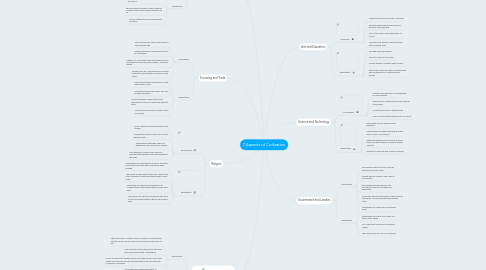
1. Social Structures and Family Life
1.1. Summerians
1.1.1. Three major social groups, nobles, commoners, and slaves.
1.1.2. More than 90% of the people in Mesopotamia were farmers due to the rich soil.
1.1.3. The commoners worked for palace and temple domain, they also worked as farmers and merchants.
1.1.4. The slaves worked in buildings and also belonged to the palace officials.
1.2. Shang/Zhou
1.2.1. The Shang Zhou king ruled from the capital city of Anyang.
1.2.2. The land was divided into two different territories.
1.2.3. The king had the power to add or remove military leaders when ever he chose to do so.
1.2.4. Family interaction was very important for them.
2. Economy and Trade
2.1. Summerians
2.1.1. The Sumerian city states was based on farming and trade.
2.1.2. Industry became an important factor in all civilizations.
2.1.3. Copper, tin, and timber were important goods in exchange for dried fish, wool, wheat , and metal goods.
2.1.4. Around 3000 B.C. the wheel was invented making the transportation of goods much easier.
2.2. Shang/Zhou
2.2.1. They lacked written language for a very long period of time.
2.2.2. Documented economics were very rare for their civilization.
2.2.3. The silk road was a major part in this agricultural purpose in China that helped it grow.
2.2.4. Silk was very commonly traded in their civilization.
3. Geography and Agriculture
3.1. Summerians
3.1.1. There was never a regular supply of water in Mesopotamia but the soil was so enriched over the years by the layers of silt.
3.1.2. It was the two rivers that became the basis upon which the wealth of the region.
3.1.3. An arc of land from Mediterranean Sea to the Persian Gulf called Fertile Crescent had rich soil and abundant crops to sustain life in the early civilization.
3.1.4. The Three main independent cities in Southern Mesopotamia were Eridu, Ur, and Urak.
3.2. Shang/ Zhou
3.2.1. There are two great rivers of the Shang/ Zhou river valley the Huang He and the Chang Jiang river.
3.2.2. The Huang He river stretches across China for more than 2,900 miles and carries rich yellow silt all the way from Mongolia to the Pacific Ocean.The Huang He river stretches across China for more than 2,900 miles and carries rich yellow silt all the way from Mongolia to the Pacific Ocean.
3.2.3. The two major rivers merge together to create a great food-producing area.
3.2.4. The valley is also surrounded by mountain ranges, which makes it hard for people to travel and trade their crops.
4. Religion
4.1. Summerians
4.1.1. Many religious events were held at the temple.
4.1.2. They believed that all cities had it's own individual god.
4.1.3. They believed that their gods and goddesses had supernatural powers..
4.1.4. They believed in divine order, which is everything that happens was pre planned by the gods.
4.2. Shang/Zhou
4.2.1. They believed in supernatural forces so that they could talk to the gods and receive help when needed.
4.2.2. The priests of the Shang/ Zhou river valley made many sacrifices to the gods attempting to bribe them.
4.2.3. The people of Shang/ Zhou believed in an invisible heaven that people went to when they died.
4.2.4. They were very spiritual and performed rituals to try and contact with the gods to give them help.
5. Arts and Education
5.1. Sumerians
5.1.1. Weapons such as an ax made of bronze.
5.1.2. Amulets shaped like animals made of precious stone like gold.
5.1.3. Jars to store grains and watermade of calcite.
5.1.4. Cosmetic bow with lid, inlaid with lapis lazuli,silverand shell.
5.2. Shang/Zhou
5.2.1. Spouted ritual wine vessel.
5.2.2. Altar set made out of bronze.
5.2.3. Handle-shaped ornament made of jade.
5.2.4. Ritual food container made of bronze inlaid with composition of bone black and lacquer.
6. Government and Leaders
6.1. Summerians
6.1.1. The Governors had to make sure that everyone paid their taxes.
6.1.2. Making laws by creating "The Code of Hammurabi"
6.1.3. The Akkadian Empire was the first successful empire to last beyond a generation.
6.1.4. It was very hard for the people of the Sumerian river valley to communicate with isolated cities.
6.2. Shang/Zhou
6.2.1. Controlled by a large series of different kings.
6.2.2. Established the towns first capital in a town called Shang.
6.2.3. All of the kings ruled from the political capital.
6.2.4. They had chosen to rule as a Monarchy.
7. Science and Technology
7.1. Summerians
7.1.1. Writing and systematic record keeping by cave painting.
7.1.2. The invention of the plow to make farming much easier.
7.1.3. Social and economic organizations.
7.1.4. Units of time (putting the day into 24 hours).
7.2. Shang/Zhou
7.2.1. Discovered how to make silk from silkworms.
7.2.2. Learned how to make books with long thin strips of woo, and bamboo.
7.2.3. Made new weapons for war such as wood, stone, and bone dwards, and horse drawn charriots.
7.2.4. Invention of the bow and arrow for warfare.
